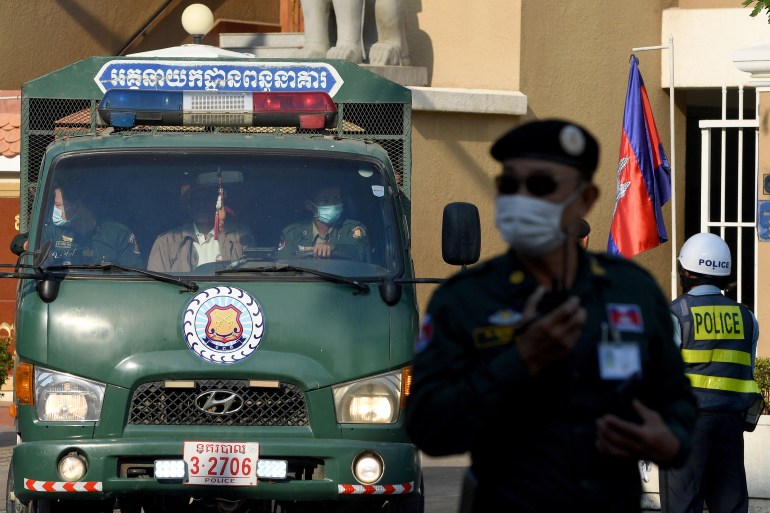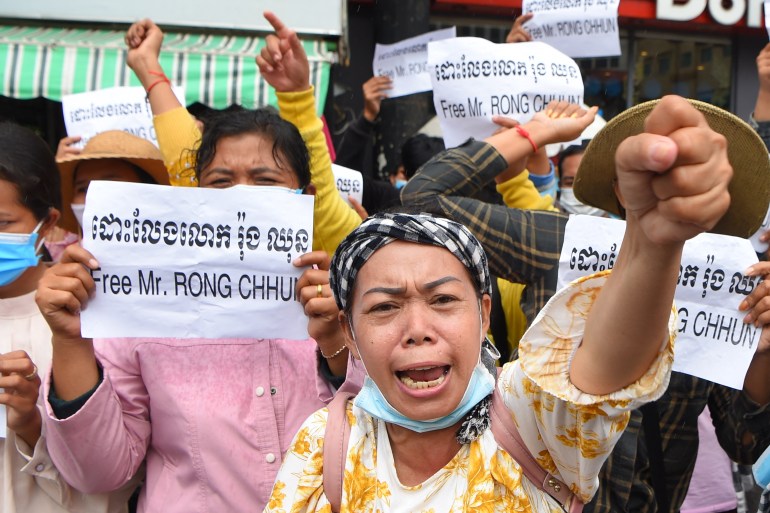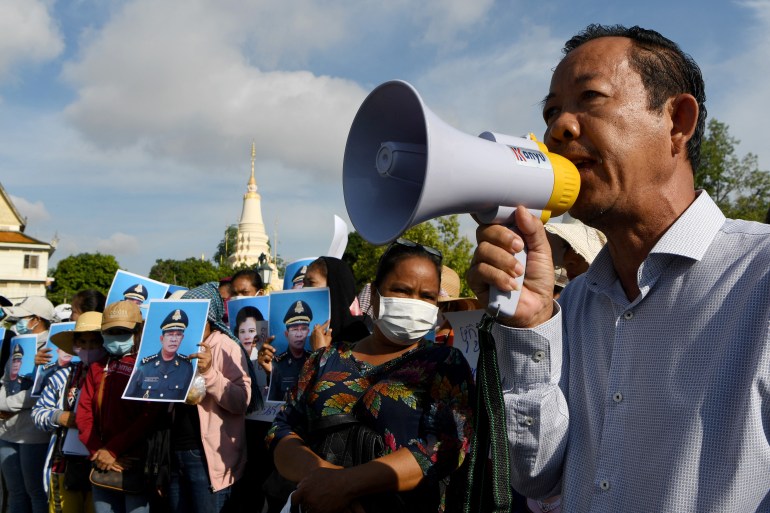Cambodia union leader faces court verdict as crackdown continues | Human Rights News
Phnom Penh, Cambodia – A Cambodian court will rule on Wednesday whether prominent labour rights activist Rong Chhun is guilty of “incitement”, amid a continuing crackdown on critical voices in the country.
The case appears to stem from comments Rong Chhun made about land rights for villagers along the Cambodia-Vietnam border and is being closely watched by the local and international community. The activist, who is in his early 50s, faces up to two years in prison if found guilty.
“Rong Chhun is one of Cambodia’s most tireless defenders of labour rights,” said Naly Pilorge, director of LICADHO, a Cambodian human rights group. “His continued imprisonment at the height of a global pandemic needlessly puts his health at risk and he should be released and all charges against him dropped.”
Rong Chhun was arrested from his home on July 31 last year and has been in prison ever since.
A month after his arrest, Rong Chhun, who is president of the Cambodian Confederation of Unions and a member of civil society group the Cambodian Watchdog Council, was charged with “incitement to commit a felony or cause social unrest” based on a social media post about the border demarcation between Cambodia and Vietnam.
The border has been a sensitive issue in Cambodia, where anti-Vietnamese sentiment remains strong, since the fall of the Khmer Rouge more than 40 years ago. The opposition has sought to capitalise on anti-Vietnamese feeling, accusing the government under Prime Minister Hun Sen of being too lenient towards Cambodia’s wealthier neighbour.
“If the court is independent, I believe it will drop charges against my uncle. He did not cause chaos or incite anyone,” said Rong Vichea, 28, Rong Chhun’s nephew who is worried his uncle could be infected with COVID while in prison.
“My uncle’s health is not good. He looks skinny.”
 Police stand guard as a van carrying prisoners, including Rong Chhun, arrives at Phnom Penh Municipal Court in January [Tang Chhin Sothy/AFP]
Police stand guard as a van carrying prisoners, including Rong Chhun, arrives at Phnom Penh Municipal Court in January [Tang Chhin Sothy/AFP]Cambodia has a long record of cracking down on activists, human rights defenders and opposition groups. Rong Chhun has been arrested and jailed multiple times over the course of his career while an increasing number of activists, as well as monks and rappers, have been charged with “incitement”.
“The charges and entire trial of Rong Chhun have been politically motivated from the start, aimed at one thing only: putting Cambodia’s most active trade union leader behind bars for his criticism of the government and its policies,” said Phil Robertson, deputy Asia director for Human Rights Watch.
“He should have never been arrested in the first place, and the charges against him should be dropped.”
Shrinking civic space
In a 2020 report by the UN Human Rights Office in Cambodia, the UN secretary-general detailed how “civic and democratic space in Cambodia had been shrinking”, and the work of human rights and civil society organisations subjected to “undue interference intimidation or harassment”.
“We urge the authorities to be vigilant to ensure that criminal law is not used to restrict the legitimate activities of human rights defenders working to promote the protection of human rights,” said Liz Throssell, the spokesperson for the UN Human Rights Office in Geneva.
The UN says at least 24 human rights defenders, 12 of whom are women, are currently in jail for exercising their rights or expressing their concerns, either in person or online. Hundreds of opposition members have also been arrested since the main opposition party was outlawed ahead of elections in 2018.
In December of that year, Rong Chhun was among six union leaders who were given two-and-a-half-year suspended sentences after being found guilty of inciting acts of violence and blocking traffic during a protest over wages in late 2013 and early 2014.
They were also ordered to pay more than $8,600 as compensation to those who were affected.
The conviction, however, was later dropped by the higher court, in a move union leaders say was the result of threats from the European Union to remove Cambodia’s duty-free trading access under the Everything But Arms arrangement.
“The treatment of labour union leaders by governmental authorities in Cambodia has a volatile history and has been the subject of concern by various international and regional authorities, including the International Labor Organization, the European Commission, and certain United Nations Special Rapporteurs,” the American Bar Association wrote in a November 2020 report.
 Rong Chhun was arrested in 2020, accused of ‘incitement’ and kept in custody pending trial [File: Tang Chhin Sothy/AFP]
Rong Chhun was arrested in 2020, accused of ‘incitement’ and kept in custody pending trial [File: Tang Chhin Sothy/AFP]The controversial Trade Union Law, as well as the Law on Associations and Non-Governmental Organizations (LANGO), which was passed in August 2015, have raised the stakes for those who protest.
“Labor organizers are individually targeted with criminal prosecutions, in which the slow-moving criminal trial process becomes a punishment in and of itself,” the report said.
Union leaders have also faced violence and worse.
Chea Vichea, the former leader of the Free Trade Union of Workers who had support from thousands of fellow workers, was shot dead near Phnom Penh’s Independence Monument in January 2004. He had risen to prominence for his work in getting the minimum wage raised by organising protest after protest. His killers have yet to be found and brought to justice.
The World Justice Project (WJP) in 2020 ranked Cambodia second to last among 128 countries on its index on adherence to rule of law. In East Asia and the Pacific, WJP ranked Cambodia 15th out of 15 countries. The score is based on factors including constraints on government powers, absence of corruption, fundamental rights, civil justice and regulatory enforcement in the country.
Still, while some say the case could yet be dropped, others worry the government might want to make an example of Rong Chhun.
“Rong Chhun is facing politically motivated charges in a kangaroo court controlled by the ruling CPP (Cambodian People’s Party), so there is no way the verdict will be fair,” said Robertson.
“PM Hun Sen and his government are trying to do whatever they can to intimidate community activists and critics, and the persecution of Rong Chhun is intended to show that even high-profile, national labour leaders are not safe.”
‘Stay strong’
Chin Malin, a spokesperson for the Ministry of Justice and the government’s Cambodian Human Rights Commission (CHRC), says the court’s investigation has found evidence that supports the charge and that Rong Chhun’s supporters should focus less on criticising the government and more on showing the evidence that undermines the charge.
“If human rights groups want to help him, they should provide legal assistance, participate in court proceedings, and find solid evidence, solid testimony to acquit him from the charge.”
 Rong Chhun has been a labour rights activist for more than 20 years [File: Tang Chhin Sothy/AFP]
Rong Chhun has been a labour rights activist for more than 20 years [File: Tang Chhin Sothy/AFP]Choung Chou Ngy, Chhun’s lawyer, says his client is innocent.
“My client is not guilty of inciting, as the charge says,” he said.
Rong Vichea, who last saw his uncle at a hearing last month, says the union leader should – instead of being behind bars – be praised for the work he has done to help improve workers’ and teachers’ wellbeing since he established the Cambodian Independent Teachers Association more than 20 years ago.
In spite of being in jail and unsure of his fate, Rong Chhun remains undeterred.
“He asked about his colleagues and fellow workers’ wellbeing, and told us to stay strong and keep helping find justice for our society,” Rong Vichea said.
